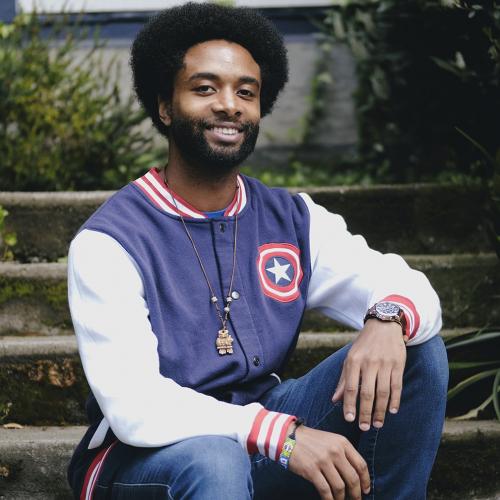In his research, PhD student Kainen Bell seeks to understand how stakeholders collaborate to prevent the use of surveillance technologies in their communities. Bell was recently awarded a Wikimedia Race and Knowledge Equity Fellowship to support his work in creating resources, documents, and publications that support the efforts of a national anti-surveillance campaign in Brazil (#TireMeuRostoDaSuaMira).
Why did you decide to pursue a degree in information sciences?
I knew little about the field of information sciences when I started researching PhD programs. My original plan was to pursue a PhD in business and specialize in technology for social good or corporate social responsibility. However, while having an informational interview with a doctoral student at MIT, Jaleesa Trapp, who is also from my hometown (Tacoma, Washington), I learned that my interests aligned with the iSchool programs. Information sciences perfectly fit my interdisciplinary background in social work, business information systems, and community-based research. I didn't realize it at the time, but my previous studies led me to this program and helped me bring a diverse perspective to the iSchool. I love that my classmates have very different academic backgrounds and research interests and that multiple career paths are acceptable.
Why did you choose the iSchool at Illinois?
I never expected to live in the Midwest and didn't know about the iSchool at Illinois until I researched PhD programs. To my surprise, the iSchool was the clear, best fit for my work and passions. The work of my current advisor [Anita Say Chan] stood out because of her work in Latin America that centers on social justice, activism, and decolonial approaches to technology studies; the work of her lab, The Community Data Clinic; and her experience with ethnographic methods. Furthermore, I learned that UIUC has a Lemann Center for Brazilian studies, which funds student research about Brazil and could help me explore further opportunities to research in Brazil. UIUC was the only institution I applied to that offered these opportunities to prioritize my research in Brazil, and I was offered the Graduate College Fellowship, which funded three years of my program, and later on received a Foreign Language Area Studies (FLAS) Fellowship to study Portuguese. Also, I didn't know this at the time, but influential scholars that I look to for inspiration and cite, such as Dr. Safiya Noble and Dr. André Brock, graduated from our program.
What are your research interests?
I investigate resistance to digital surveillance technologies in Brazil, such as facial recognition, including public awareness campaigns, data activism protests, and collective actions by grassroots organizations. My goal is to understand how community stakeholders—nonprofit organizations, research institutes, policy makers, and community members—collaborate to prevent the use of surveillance technologies in their communities.
There are a growing number of initiatives in Brazilian cities to invest in large-scale facial recognition camera projects to improve public safety as well as an increase in resistance from grassroots organizers. These facial recognition projects provide huge risks because there are increasing reports of innocent people being arrested due to misidentifications and studies revealing the overuse of facial recognition by police on Afro-Brazilian populations. I am interested in learning how to be an ally to these resistance movements through my research and identity as an activist scholar.
What do you do outside of class?
Recently, two of my doctoral student colleagues, Jessie Maimone and Kyra Abrams, and I created a student group to support Black identifying doctoral students in the Information Sciences and Informatics programs. We have been coordinating activities and planning for events in the fall and spring.
In my spare time, I love to salsa dance and roller skate. There is a big Latin dance community on campus, which was surprising when I arrived in Champaign. I've been dancing for over ten years, and at both my undergraduate and master's institutions, I was on the Latin dance team. I also attend college sporting events on campus like football, basketball, and volleyball and play sports at the rec centers on campus.
What career plans or goals do you have?
Upon graduation, I hope to open a community-based research center where I can collaborate with community members and organizations in the U.S. and Brazil around questions of digital inclusion and anti-surveillance. I am also interested in working at a research institution as a community researcher or working at a foundation as a specialist in community-based grantmaking in Latin America.
